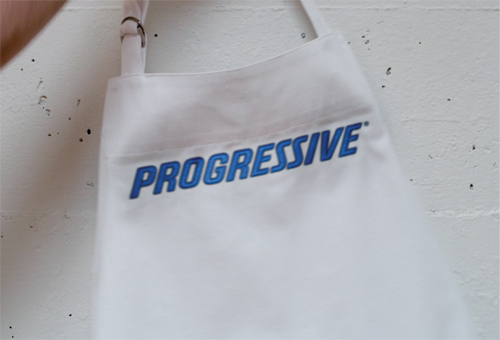Insurance Marketing
New Messages
Insurance industry CEOs step into the spotlight in TV and social media ads to deliver messages about their commitment to customers and the resilience of their organizations in the midst of the pandemic.
The COVID-19 pandemic has ushered in many first-time changes, including state and federal social distancing mandates, the global shuttering of businesses and a widespread call for remote workforces.
The worldwide crisis has also for the first time prompted some of insurers' top-ranking officials to take to the TV airwaves and social media platforms to reiterate in ads their organizations' commitment to customers during these unprecedented times.
In its “Good Neighbor Relief” ad released in April, State Farm Chairman and CEO Michael Tipsord talks about how “now more than ever being a good neighbor means everything.”

APRON RELIEF: Progressive CEO Tricia Griffith talks about the company’s Apron Relief Program in an ad.
Progressive CEO Tricia Griffith has also lent her voice to a new spot unveiled this spring in which she talks about the apron as a symbol of protection and informs customers about the relief available to them as the crisis unfolds.
“Because COVID-19 has altered the lives of so many around the world, we immediately focused on a message about how we were helping our customers, employees, agents and communities through our Apron Relief Program, in which we have committed more than $1 billion in this time of need,” said Progressive's Chief Marketing Officer Jeff Charney.
Tipsord, along with several State Farm associates and company pitchman “Jake,” is also relying on the far-reaching powers of advertising to highlight the various measures State Farm is taking through its Good Neighbor Relief program to better serve its customers, including returning $2 billion to auto policyholders.
The creation of the ad was another first for State Farm. In accordance with social distancing and work-from-home directives, Tipsord and his co-stars in the ad recorded the spot, which was produced by The Marketing Arm, inside their homes using video conferencing technology and mobile devices, said company spokeswoman Anna Bryant.
Different Approaches
Marketers are always standing at the ready to adapt advertising and marketing strategies during changing times and crises.
Over the past several months, news of the COVID-19 pandemic has dominated nearly every local and national headline and become the foremost issue on consumers' minds. As a result, 88% of people said the pandemic is changing how they consume content online, according to Integral Ad Science's Coronavirus Ad Adjacency study released in March.
As insurance marketers navigate the unchartered waters of this global outbreak, they said they're acclimating to “the new normal” by creating new and proactive ways to market their brands online and in other media and spread the word about the dedication and resilience of their industry and organizations in the face of uncertainty.

STAY-AT-HOME ORDERS: Liberty Mutual’s ad follows its “Truth Tellers” campaign theme without its customary talent in the foreground.
Amid the pandemic, Liberty Mutual has continued running its popular “Truth Tellers” and “LiMu Emu” ad campaigns in market, along with introducing COVID-19 broadcast and social media messaging and a new 30-second TV ad that informs customers of accommodations available to them, including a premium refund, flexible payment options and waiving of fees, said company spokesman Glenn Greenberg.
The pandemic, which has claimed the lives of hundreds of thousands of individuals globally, is also forcing marketers to create messages that strike the right tone with consumers. In fact, 92% of markets said they have modified their ad messages since mid-March, with nearly half pointing to “substantial” modifications, according to a survey by the Association of National Advertisers.
Aflac altered its social media approach by temporarily pulling scheduled posts irrelevant to the coronavirus environment “to ensure the public that we understood the gravity of the situation,” said company spokesman Jon Sullivan.
The supplemental insurer is also using social channels to direct consumers and small-business owners to customized landing pages filled with pertinent frequently asked questions and guidance on where to find additional information. And on April 23, during the NFL Draft on ABC and ESPN, Aflac debuted a new people-centric brand campaign and ad that reinforce the company's commitment to policyholders and potential customers that say when they are protected by Aflac, whether during a crisis or daily circumstances, they're never alone.
Messages like those are being well-received by consumers, who are interested in hearing how brands are addressing their concerns during these times.
According to a 4A's Research survey of 1,000 consumers conducted in March, 43% of respondents said it's reassuring to hear from brands they know and trust, while 40% want to hear what brands are doing in response to the pandemic.
USAA is touting that message in a TV commercial that debuted in April. The spot highlights how overcoming challenges is what defines USAA members—the military community, and how, as the voice-over says, being prepared “isn't a new thing” for them “or their first experience with social distancing.”
“Knowing what our military community and our whole society are going through, we needed a message that was supportive, empathetic and built a connection and sense of community,” said Mayra Rivera, vice president of brand management for USAA. “After evaluating all of our advertising, we quickly created a new narrative showcasing how USAA and our employees stand ready to serve active duty, veterans and their families. We understand the needs of our members and communities have changed, and we want everyone to know USAA is ready to help where we can.”
As in any crisis, with challenge comes opportunity. And as a calamity like COVID-19 unfolds, marketers have the chance to not only bolster their brands but to also cultivate new consumer connections and strengthen existing customer relationships and long-lasting value. However, sometimes that requires marketers to pull back on ad campaigns that might send the wrong message or fail to reflect the current climate.
Also during arduous times like a pandemic, there's often a need for some levity. While consumers need more than ever to know the brands they trust are there for them, “we also know people want to be entertained and need a break from the nonstop world COVID-19 has brought,” Progressive's Charney said.
Along with debuting several new podcasts and ads focused on its “Funny Because It's True” brand content during the height of the pandemic, Charney said Progressive also unveiled in May a creative using humor that shows Flo and her fellow Superstore characters “feeling many of the same pain points we're all experiencing as they navigate working from home.”
Marketers also need to reevaluate the placement of their ads during a crisis. One-fourth of respondents to the Integral Ad Science study said they're unlikely to engage with an ad adjacent to coronavirus content, and 28% of consumers reported resistance to ads in the insurance/banking/finance category being adjacent to content about the pandemic.
Photos courtesy of Progressive and Liberty Mutual